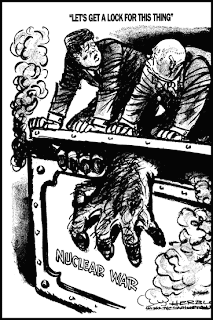Much of Kennedy's two years and ten months in office were dominated by foreign policy concerns, most of which were Cold War related. JFK came to office at a period in which American-Soviet relations were at their most strained, a tension which would eventually erupt in the form of the Cuban Missile Crisis. In this cartoon we see Kennedy and Nikita Kruschev, leader of the Soviet Union, trying to keep the beast of "Nuclear War" in his cage. This was drawn shortly after the Missile Crisis. Many cartoons drawn about the Kennedy administration featured JFK and Krushchev interacting side-by-side. The Cold War was frequently personified as a direct feud between the two men, often with both of them appearing equally bumbling.
Political Cartoons
On the night of June 17, 1972, former employees of the Nixon reelection campaign broke into the Democratic headquarters in the Watergate building. This incident began the unraveling of the Nixon Administration's abuses of power and illegal actions and the administration's efforts to cover up these activities. Two days after the break-in, Herb Block drew cartoons of Nixon and his attorney general feigning surprise, and saying, "Who would think of doing such a thing?" This was followed by one of Nixon and Department of Justice officials saying, "Remember, we don't talk until we get a lawyer." He also did a cartoon showing scandal footsteps leading to the White House. Says Herb Block: "Watergate was not even the first by the Nixon ‘plumbers.' They had previously broken into the office of Daniel Ellsberg's psychiatrist. And in the Nixon tapes, he [Nixon] tells aides how to break into such places as the IRS offices." In 1974, Herb Block produced Herblock Special Report, a book of cartoons and text devoted to Nixon's political activities from the 1940s to his resignation in 1974.
This 1968 political cartoon captures the struggle of Lyndon B. Johnson's time as President. While Johnson dreamed of a "Great Society," his presidency was haunted by the specter of Vietnam. Much of the funding he hoped to spend on social reforms went towards war in southeast Asia. Lyndon Baines Johnson moved quickly to establish himself in the office of the Presidency. Despite his conservative voting record in the Senate, Johnson soon reacquainted himself with his liberal roots. LBJ sponsored the largest reform agenda since Roosevelt's New Deal. The aftershock of Kennedy's assassination provided a climate for Johnson to complete the unfinished work of JFK's New Frontier. He had eleven months before the election of 1964 to prove to American voters that he deserved a chance to be President in his own right. Two very important pieces of legislation were passed. First, the Civil Rights Bill that JFK promised to sign was passed into law. The Civil Rights Act banned discrimination based on race and gender in employment and ending segregation in all public facilities.
Subscribe to:
Comments (Atom)


